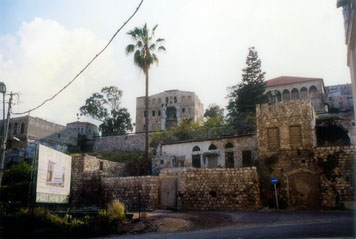
Arab houses in Haifa, viewed from the Port
|
 Arab houses in Haifa, viewed from the Port |
| Samia Shehadeh, Haifa, April 6:
|
|
Kamil Shehadeh, director of Beit al-Na'ima, suggests I record with his sister Samia. Older than he is, she will remember their life soon after the Nakbeh. She is in charge of Beit al-Na'ima's 'Women's Club', and is active with Bat Shalom, a Jewish and Palestinian Arab feminist NGO.
I make two visits to Samia and her husband Shafiq, who live in a pleasant area between Allenby Street and Mount Carmel, consisting of one-up one-down apartments with balconies, gardens, cypress trees and palms. Their home isn't large. The first time we just chat, without recording. Samia tells me about her work with Bat Shalom. I ask her whether they visit women prisoners. She says they visit and support women prisoners who have killed husbands who beat them up. But what interests me most are her stories about Jewish neighbours. There were the good Jewish neighbours "whose laps were warm". But there was also the time she took her kid brothers and sisters to the swings in the park, and the Jewish mothers pushed her away and called her 'sha'fit 'Arabi' (Arab 'piece' = nobody). I sense that these 'good Jew'/'bad Jew' experiences offer a point of equilibrium for Palestinians in Israel who want to play a public role beyond that of local community. On the second visit Samia serves me an Israeli soft drink that is bright blue in colour, not like anything I have ever drunk. She tells me that she has been interviewed once before by an English woman doing a study of Palestinian women. She has also traveled to Jordan with the Bat Shalom. It's surely these public activities that give her such self-confidence in facing the recorder. She doesn't hesitate. Shafiq cooks lunch as we sit in the living room. Samia records her story. She tells of her life as the eldest daughter in very large, very poor Haifa family. Fear sharpens memory: she remembers a barrel bomb explosion during the attack |
against Haifa 4, stages of her family's flight, their return through Israeli checkpoints, and postwar Haifa -- life in one room, starting work at age 15 to help her parents. She tells about marrying a man she met outside the family circle, one not chosen by her father. And about the tragic death of their oldest son, whom they sent to America to escape being recruited by the 'mukhabarat'.
She doesn't repeat today the 'good Jew'/'bad Jew' anecdotes, a loss that reminds me that no two accounts of past personal experience will ever be the same, whether in contents, sequencing, or 'tone'.
Samia Shehadeh begins by saying: |
|
4. Michael Palumbo, The Palestinian Catastrophe: The 1948 Expulsion of a People from their Homeland. London: Faber and Faber, 1987, p. 64. |
[Marie Samaan] [Abbas Zeinideen] Copyright©2005 |
|